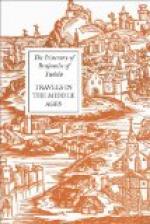[p.76]
Thence it takes three days to Rudbar where there are about 20,000 Israelites, and among them are learned and rich men. But the Jews live there under great oppression. Thence it is two days to Nihawand, where there are 4,000 Israelites. Thence it is four days to the land of Mulahid. Here live a people who do not profess the Mohammedan religion, but live on high mountains, and worship the Old Man of the land of the Hashishim[155]. And among them there are four communities of Israel who go forth with them in war-time. They are not under the rule of the king of Persia, but reside in the high mountains, and descend from these mountains to pillage and to capture booty, and then return to the mountains, and none can overcome them. There are learned men amongst the Jews of their land.
[p.77]
These Jews are under the authority of the Head of the Captivity in Babylon. Thence it is five days to Amadia where there are about 25,000 Israelites[156]. This is the first of those communities that dwell in the mountains of Chafton, where there are more than 100 Jewish communities. Here is the commencement of the land of Media. These Jews belong to the first captivity which King Shalmanezar led away; and they speak the language in which the Targum is written. Amongst them are learned men. The communities reach from the province of Amadia unto the province of Gilan, twenty-five days distant, on the border of the kingdom of Persia. They are under the authority of the king of Persia, and he raises a tribute from them through the hands of his officer, and the tribute which they pay every year by way of poll tax is one gold amir, which is equivalent to one and one-third maravedi. [This tax has to be paid by all males in the land of Islam who are over the age of fifteen.] At this place (Amadia), there arose this day ten years ago, a man named David Alroy of the city of Amadia[157]. He studied under Chisdai the Head of the Captivity, and under the Head of the Academy Gaon Jacob, in the city of Bagdad, and he was well versed in the Law of Israel, in the Halachah, as well as in the Talmud, and in all the wisdom of the Mohammedans, also in secular literature and in the writings of magicians and soothsayers.




